 Petzlover
Petzlover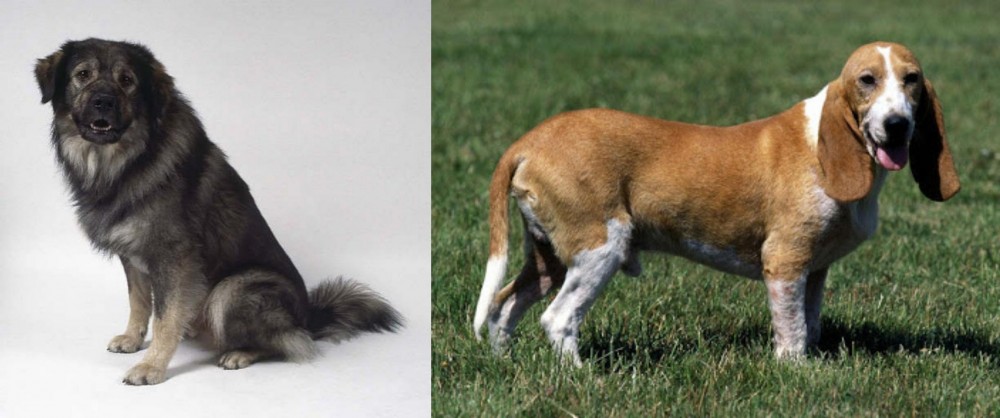 Istrian Sheepdog is originated from Slovenia but Schweizer Niederlaufhund is originated from Switzerland. Istrian Sheepdog may grow 20 cm / 8 inches higher than Schweizer Niederlaufhund. Istrian Sheepdog may weigh 25 kg / 56 pounds more than Schweizer Niederlaufhund. Istrian Sheepdog may live 4 years less than Schweizer Niederlaufhund. Both Istrian Sheepdog and Schweizer Niederlaufhund has almost same litter size. Istrian Sheepdog requires Moderate Maintenance. But Schweizer Niederlaufhund requires Low Maintenance
Istrian Sheepdog is originated from Slovenia but Schweizer Niederlaufhund is originated from Switzerland. Istrian Sheepdog may grow 20 cm / 8 inches higher than Schweizer Niederlaufhund. Istrian Sheepdog may weigh 25 kg / 56 pounds more than Schweizer Niederlaufhund. Istrian Sheepdog may live 4 years less than Schweizer Niederlaufhund. Both Istrian Sheepdog and Schweizer Niederlaufhund has almost same litter size. Istrian Sheepdog requires Moderate Maintenance. But Schweizer Niederlaufhund requires Low Maintenance
 Known also as the Karst Sheepdog, the beautiful, medium sized Istrian Sheepdog hails from Slovenia, Yugoslavia in the 1600s, being used to guard sheep. In fact, the Karst Shepherd was recognized as the Illyrian Shepherd in 1939.
Known also as the Karst Sheepdog, the beautiful, medium sized Istrian Sheepdog hails from Slovenia, Yugoslavia in the 1600s, being used to guard sheep. In fact, the Karst Shepherd was recognized as the Illyrian Shepherd in 1939.
The dog is fairly scarce in his own country, but interest in the dog started developing in the late 1970s. The Fédération Cynologique Internationale recognizes the breed and it has also been exported to the United States, being recognized by the United Kennel Club.
It is also recognized by a number of smaller kennel clubs. The dogs numbers have declined at certain periods in its history but fortunately breeding programs boosted its numbers.
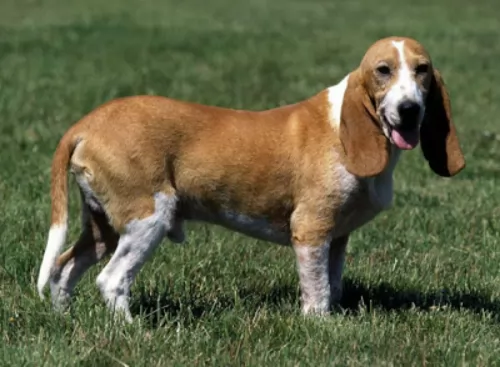 Originating in Switzerland, the Schweizer Niederlaufhund was established around 1900, when hunting became restricted to districts. The Swiss hunter needed a slower dog for the limited territory they could hunt in. Crossing selected Schweizer Laufhunds with Basset Hounds and other selected smaller, short legged hounds developed the Schweizer Niederlaufhund. By 1905 there was already a Schweizer Niederlaufhund Club.
Originating in Switzerland, the Schweizer Niederlaufhund was established around 1900, when hunting became restricted to districts. The Swiss hunter needed a slower dog for the limited territory they could hunt in. Crossing selected Schweizer Laufhunds with Basset Hounds and other selected smaller, short legged hounds developed the Schweizer Niederlaufhund. By 1905 there was already a Schweizer Niederlaufhund Club.
The Niederlaufhund became one of the best hunting dogs in the world, with its powerful body and ability to outhunt the Laufhund in tracking big game. Slower of course than the Laufhund it has a great sense of smell and an ability to easily find wounded animals. There are a few varieties, just like with the Swiss Hound again mostly because of their coloring. The Luzerner Niederlaufhund, the Jura Neiderlaufhund, and the Schwyzerlaufhund. They have musical voices that they use to communicate with the hunters and each other as well as that amazing sense of smell. They can hunt for hours without tiring and without much information from the hunter.
They are a cross breed not recognized by the larger kennel club such as the AKC and the UKC. They are recognized by the Dog Registry of America, Inc. (DRA), the American Canine Association Inc. (ACA) and most importantly by the Federation Cynologique Internationale (FCI). This last one is important because it could lead to recognition as a new breed by the UKC and the AKC.
 This is a medium sized, muscled, strong dog with an iron-grey coat that has shades of deeper grey. His beautiful coat is long, thick and fairly harsh to the touch, with the undercoat protecting the dog against cold weather.
This is a medium sized, muscled, strong dog with an iron-grey coat that has shades of deeper grey. His beautiful coat is long, thick and fairly harsh to the touch, with the undercoat protecting the dog against cold weather.
Around the neck area the hair is longer, forming an eye-catching-like mane. The stomach area has longer hair too. He has a noble look about him with kind, brown eyes and a round skull. The muzzle of the dog is dark, the limbs long and muscular and the tail is long and covered in thick fur.
The dog is slightly longer than its height, and both males and females stand at 54 to 63cm in height and weigh between 26 and 40kg. The long tail reaches right down to the hocks. The ears of the dog are fairly short and are floppy.
This dog has always made an excellent guard dog, being alert and also being distrustful of strangers. He will need to be trained and socialized if you want him to be obedient to you and more amicable around children in the home as well as visitors to the home.
If he is trained and well socialized, he is able to make a good pet. However, he is an energetic dog, used to working and he isn't recommended for life in the city if there is only a tiny garden. He needs space and will require a large garden.
He will also need to be exercised and not just left to his own devices in the backyard. Because he is essentially a working dog he doesn’t easily fit into the role of pet and companion. He is a working dog and will need to be kept busy.
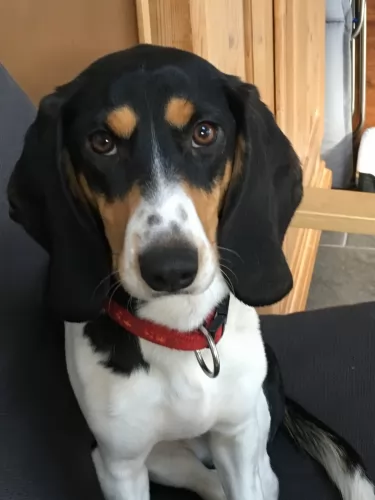 The Schweizer Niederlaufhund is a medium size, short dog. They look like their cousins, the Schweizer Laufhund but smaller. Their body is just slightly longer than it is tall, so you are left with the impression of a mostly square dog. The Niederlaufhund is well put together, with strong legs, a noble head, long droopy ears, broad chest, and a low held tail.
The Schweizer Niederlaufhund is a medium size, short dog. They look like their cousins, the Schweizer Laufhund but smaller. Their body is just slightly longer than it is tall, so you are left with the impression of a mostly square dog. The Niederlaufhund is well put together, with strong legs, a noble head, long droopy ears, broad chest, and a low held tail.
The Small Lucerne Hound has a white cote with smooth speckles of black or gray making them appear to be blue.
The Small Bernese Hound has a tricolor coat of white, tan and black. There are tan marks on the eyebrows. There is a wire haired Small Bernese as well. He has a short beard.
The Small Schwyz Hound is smooth coated in white with orange or yellow-red patches. The wired haired version is extinct.
The Small Jura Hound is a single coated dog with a black coat and tan marking above his eyes as eyebrows as well. He might have some white as well.
 Your Istrian Sheepdog is a unique, strong-willed dog that is used to guarding, and working and he wants to be kept involved and busy.
Your Istrian Sheepdog is a unique, strong-willed dog that is used to guarding, and working and he wants to be kept involved and busy.
He is wary of strangers and makes an excellent guard dog for any family home. Remember that it is never good to invest in a dog purely for guard dog purposes. A dog such as the Istrian Sheepdog is a social creature and he also wants- and needs to be part of a human family that provides him with plenty of interaction with them.
The Istrian Sheepdog is a loyal, loving dog who is capable of forming strong bonds with his human family. With proper training and socialization he makes a good friend of children and the elderly too.
Include him in all your family activities just like any human family member and he will make you a splendid, courageous pet.
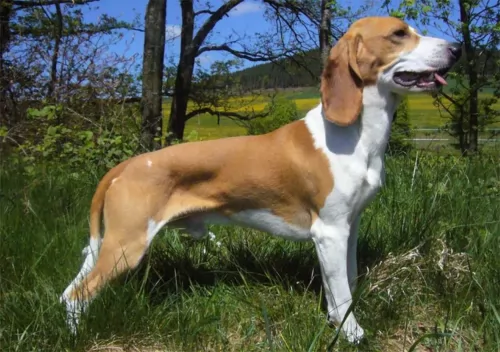 Children friendliness – yes, they are but use caution around small children and small prey.
Children friendliness – yes, they are but use caution around small children and small prey.
3. Adaptability - needs room to run and explore – is very frustrated when confined.
 As with many other dog breeds, the Istrian Sheepdog is a healthy dog that, because of history of hard work, is robust and able to stand up well to common dog illnesses.
As with many other dog breeds, the Istrian Sheepdog is a healthy dog that, because of history of hard work, is robust and able to stand up well to common dog illnesses.
However there is one dog illness that strikes many dogs and at any age, and it is hip dysplasia. This is a malformation of the hip joints.
You'll notice that your once active dog is lethargic, doesn't want to play so much anymore and battles to get up after lying down. The disease is painful for your dog and it can lead to mobility issues. The disease is diagnosed with x-rays and your vet will recommend treatment options to make life more comfortable and less painful for your beloved pet.
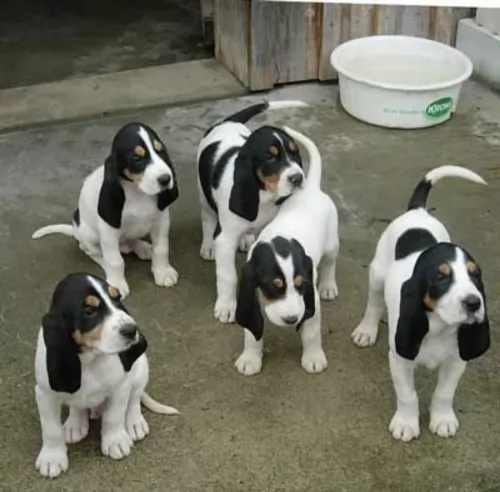 The Niederlaufhund Is prone to a very medical issues to keep an eye on. They include:
The Niederlaufhund Is prone to a very medical issues to keep an eye on. They include:
• Hip Dysplasia – This comes from hip joints that are not well formed and cause reduced mobility and pain. Parents can be tested before the dogs are bred to make sure their hips are good, and that dysplasia will not be passed to puppies. This dysplasia can cause arthritis and even lameness.
• Ear Infections – With long drooping ears it is easy for the dog to acquire ear infections. This is even more so for a hunting dog like the Niederlafhund. It is important to clean the dog’s ears on a regular basis.
 This is a dog that is used to guarding his flock and he will need to be in a home that has a fair sized garden. He can adapt to life in the city or to the countryside, but wherever he is, he will need sufficient exercise. Take him with you on your walks or hikes and give him some rope- and ball games.
This is a dog that is used to guarding his flock and he will need to be in a home that has a fair sized garden. He can adapt to life in the city or to the countryside, but wherever he is, he will need sufficient exercise. Take him with you on your walks or hikes and give him some rope- and ball games.
Wherever you live in the world, when the Winter winds howl and blow in icy rain or snow, a dog is at an increased risk of illness. You decided to have a dog in your home and it is your responsibility to care for him. Winter weather is downright unpleasant and dangerous for most pets.
Bring your pet in during such weather and provide him with a warm, dry sleeping space. During hot weather, make sure your pet has a cool, shady spot to lie down in, out of the boiling sun. Whatever weather you're experiencing, your pet should never ever be without a constant supply of fresh, cool water.
Provide him with excellent food that is full of vitamins and minerals to keep him healthy. Learn to know what human foods can be toxic for him and cause him digestive problems.
Your double coated Istrian Sheepdog will need a thorough brushing at least twice a week because of his dense, double coat. He does shed and isn't a hypoallergenic dog. His thick coat can tangle easily if it isn't properly brushed and maintained.
Clip his nails when and if they grow long. Other grooming aspects for this attractive dog require checking his ears for infection and also checking his teeth as dental disease can lead to a host of serious illnesses in your dog.
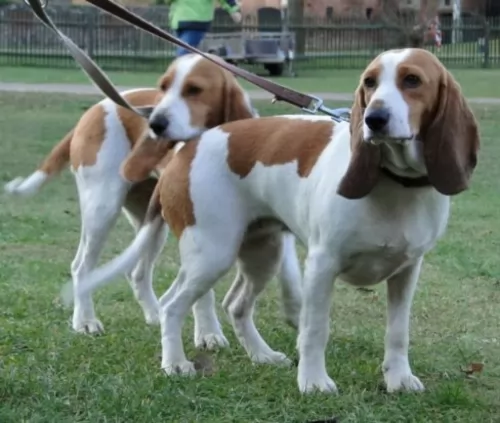 1Feeding the puppy - give 1 cup per day of high quality dog food divided into 3 meals.
1Feeding the puppy - give 1 cup per day of high quality dog food divided into 3 meals.
2.Feeding the adult – give one and one half cups of high quality dog food divided into 2 meals.
4. Games and Exercises – needs a lot of daily exercise and loves field trials, running and activities like barn hunt.